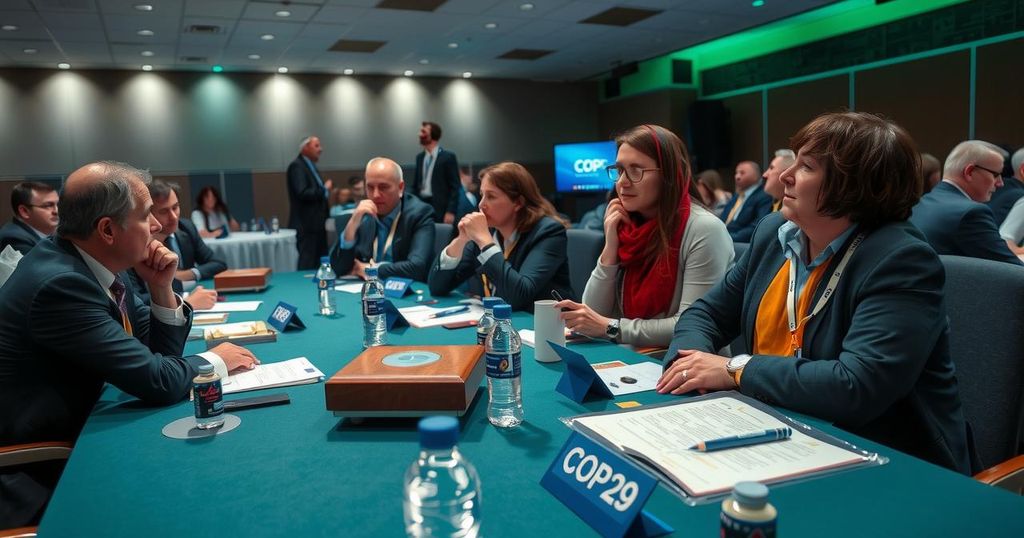Reflections from COP29: The Heart of Climate Advocacy
Attending COP29 in Baku, I explored the complexities of climate negotiations focused on financing solutions for vulnerable nations. Despite the disappointingly low financial goals set for climate action by 2035, the myriad voices I encountered revealed the urgency and resilience inherent in the struggle against climate change. Grassroots advocates serve as pillars of hope, reminding us that local actions contribute to broader justice and sustainability initiatives.
In the face of the ongoing climate crisis, personal initiatives often feel trivial against the looming enormity of global challenges. During my time at COP29, the significant United Nations Climate Change conference in Baku, Azerbaijan, I was compelled to reflect on these immense issues while also embracing the wisdom of individuals who bear the brunt of climate inaction. The conference, dubbed the “finance COP,” aimed to address funding for vulnerable nations transitioning away from fossil fuels in an increasingly unpredictable climate.
COP, short for “Conference of the Parties,” originated in 1992 with the aim of combating the adverse effects of climate change. Recognizing the disproportionate impact on developing countries, the conference has focused on formulating strategies for mitigation, adaptation, and financing solutions, culminating in previous agreements such as the Kyoto Protocol and the Paris Agreement. As I engaged with diverse representatives and their problems in Baku, this broader narrative of collective action emerged.
The Christian Climate Observers Program (CCOP) facilitated my attendance at COP29, bringing together various emerging leaders and climate advocates. We began our days with reflections before navigating the intricate negotiations where representatives from 198 parties convened. Despite the hurdles associated with attending, the experience presented opportunities to glean insights and stories from diverse voices—essentially the heart of COP29.
The agenda was focused primarily on securing financial commitments to assist developing nations, emphasizing the staggering need for $1.3 trillion just to meet basic climate goals. Yet, the final agreement, calling for $300 billion by 2035, was met with considerable disappointment and criticism from those representing affected countries. The sentiment echoed that while developed countries contributed the most greenhouse gases, developing nations faced the dire consequences without adequate support.
At COP29, I encountered poignant narratives from individuals like Jocabed of Panama, who illustrated how rising seas threatened both her community and cultural identity, and Litara of Samoa, who encapsulated the despair that comes with repeated cyclones and the potential loss of entire communities. Dorcas from Kenya reminded me that climate activism need not begin with grand gestures; even small, localized actions contribute to broader climate justice. Their stories provided critical context, illuminating the human stakes behind technical negotiations.
Upon returning home—the stark reality of winter gardens serving as a backdrop—I grappled with the mixed emotions surrounding my COP29 experience. Although the finalized agreement fell short of expectations, I discovered an enduring sense of hope in the fierce resilience exhibited by those I met. Even amidst the unyielding struggle against climate change, advocates from varied backgrounds persist in their efforts.
Ultimately, while the UN may struggle to deliver urgent climate plans, it is the grassroots movements—youth, indigenous populations, and marginalized voices—that underscore the transformative potential of collective action. I endeavor to harness this inspiration to support their endeavors and amplify their stories, advocating for a sustainable future towards which we can all strive together.
The non-profit Christian Climate Observers Program (CCOP) emphasizes the role of grassroots leadership in advocating for climate action within the global dialogue surrounding the climate crisis. Created in the aftermath of international treaties such as the Rio Earth Summit in 1992, COP meetings have become essential forums for countries to negotiate terms of climate policy and finance. The COP process, with the involvement of nearly 200 nations, plays a critical role in shaping global responses to climate emergencies and addressing the disproportionate impact on vulnerable populations, often from developing countries. Each COP aims to balance the interests of industrialized nations, which historically have contributed the most to greenhouse emissions, against the immediate needs of those bearing the repercussions of climate change. Understanding the historical and institutional context of COP is crucial for engaging meaningfully in these discussions.
The experience at COP29 highlighted the complexities and challenges of international climate negotiations while showcasing the resilience and advocacy of marginalized communities affected by climate change. The event underscored the necessity for actionable solutions at the global level while valuing grassroots voices, whose experiences ground abstract negotiations in the stark reality of environmental injustice. The journey towards collective climate action demands both commitment from global leaders and support for the local advocates working tirelessly in facing climate adversity. Embracing these narratives and remaining engaged will be crucial for reinforcing a collective movement towards a sustainable future.
Original Source: reformedjournal.com




Post Comment